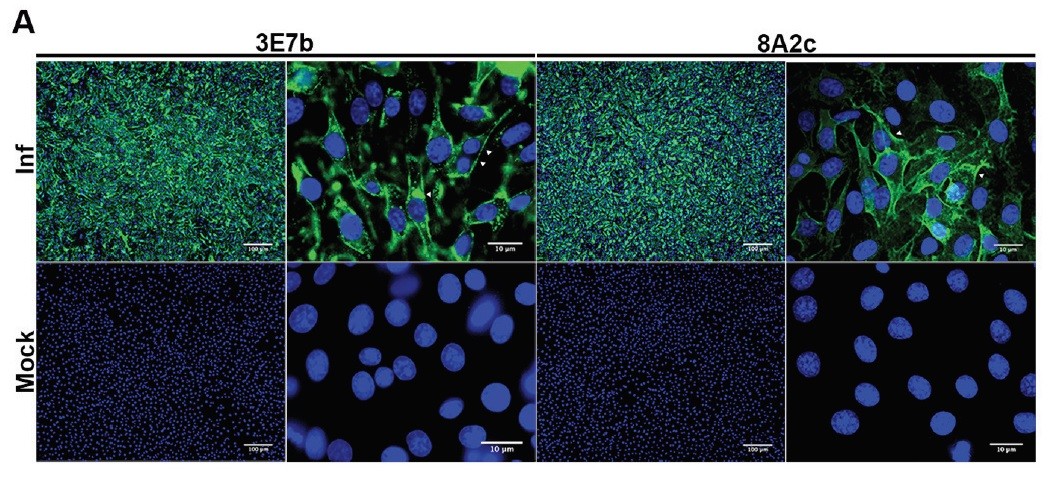Cat. #153199
Anti-CHIKV [8A2c]
Cat. #: 153199
Unit size: 100 ug
Availability: 1-2 weeks
Target: N218 epitope on E2 protein of CHIKV
Class: Monoclonal
Application: ELISA ; IHC ; Fn ; WB
Reactivity: Virus
Host: Mouse
£300.00
This fee is applicable only for non-profit organisations. If you are a for-profit organisation or a researcher working on commercially-sponsored academic research, you will need to contact our licensing team for a commercial use license.
Contributor
Institute: A*STAR Accelerate Technologies Pte Ltd
Tool Details
*FOR RESEARCH USE ONLY
- Name: Anti-CHIKV [8A2c]
- Alternate name: Chikungunya virus
- Clone: 8A2c
- Class: Monoclonal
- Conjugation: Unconjugated
- Reactivity: Virus
- Host: Mouse
- Application: ELISA ; IHC ; Fn ; WB
- Description: Chikungunya virus (CHIKV) is known to be transmitted to humans by mosquito vectors, primarily Aedes aegypti and A. albopictus. Symptoms of chikungunya infection generally initiated 4ÄËĂÂĂÂ7 days after the bite of the mosquito vector and usually include high fever, asthenia, chills, headache, diarrhoea, vomiting and rash. CHIKV gained its infamity from the severe outbreak in the Indian Ocean island of La ReÄËĂÂĂÂunion in 2005-2006, in which 38.2% of the population was infected and 41.5 million people were documented to have experienced hemorrhagic fever manifestations. Since the re-emergence of CHIKV in La Reunion, epidemic outbreaks of CHIKV infection have been reported globally and CHIKV is now considered endemic in 34 countries across Europe, Australia, Asia and Africa. Mouse monoclonal antibodies that are specific to chikungunya virus can be used as a research or diagnostic reagent to detect infection of cells.
- Immunogen: Live chikungunya virus
- Isotype: IgM
- Myeloma used: Sp2/0-Ag14
- Recommended controls: Infected BHK cells
Target Details
- Target: N218 epitope on E2 protein of CHIKV
- Target background: Chikungunya virus (CHIKV) is known to be transmitted to humans by mosquito vectors, primarily Aedes aegypti and A. albopictus. Symptoms of chikungunya infection generally initiated 4ÄËĂÂĂÂ7 days after the bite of the mosquito vector and usually include high fever, asthenia, chills, headache, diarrhoea, vomiting and rash. CHIKV gained its infamity from the severe outbreak in the Indian Ocean island of La ReÄËĂÂĂÂunion in 2005-2006, in which 38.2% of the population was infected and 41.5 million people were documented to have experienced hemorrhagic fever manifestations. Since the re-emergence of CHIKV in La Reunion, epidemic outbreaks of CHIKV infection have been reported globally and CHIKV is now considered endemic in 34 countries across Europe, Australia, Asia and Africa. Mouse monoclonal antibodies that are specific to chikungunya virus can be used as a research or diagnostic reagent to detect infection of cells.
Applications
- Application: ELISA ; IHC ; Fn ; WB
Handling
- Format: Liquid
- Concentration: 1 mg/ml
- Unit size: 100 ug
- Storage buffer: PBS with 0.02% azide
- Storage conditions: -15° C to -25° C
- Shipping conditions: Shipping at 4° C
Related Tools
- Related tools: Anti-CHIKV [3E7b] ; Anti-CHIKV [6A11] ; Anti-CHIKV [11E7]
References
- Lam et al. 2015. MAbs. 7(6):1178-94. PMID: 26305993.




